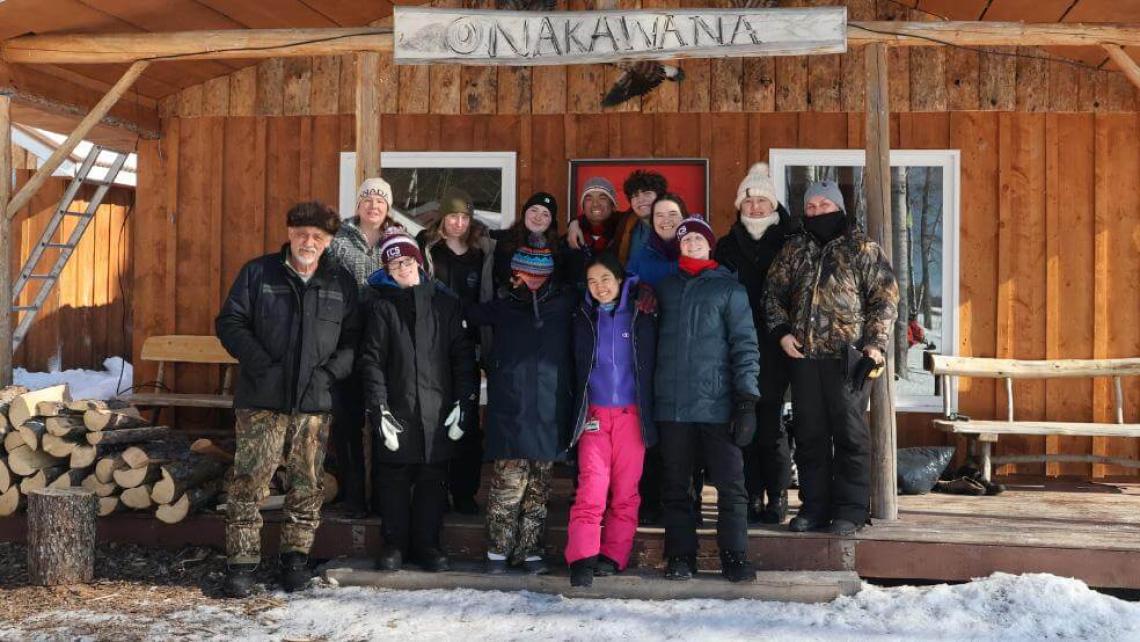Ten Trinity College School students and two staff members journeyed north to Camp Onakawana, near Moosonee, Ontario, for an unforgettable week during March Break. The purpose of the trip was to build connection and foster resilience through land-based learning. To achieve this, our group journeyed north by bus, then train, and finally hiked through the bush to the camp founded and run by the Tozer family on the banks of the Onakawana and Abitibi Rivers. Camp Onakawana was created according to a simple yet powerful philosophy: the land has everything you need to not just survive, but to flourish. If you pay attention to it, the land will not just teach you, but take care of you. It will heal you.
Throughout the week, the group spent hours and hours outdoors learning how to ice fish, make fires and cook in snow, snare rabbits and trap marten, harvest river water for dishes and toilets, and cut wood to keep the wood stoves burning. Indoors, students cooked and did dishes, played music and games, were taught by an Elder how to make dream catchers and beaded lanyards, and learned how to write their names in Cree.
When asked to identify and share words that describe their experiences, the students initially described the trip as one might expect: fun, cool, amazing. Then, as they reflected more deeply, the words became indicative of a very special experience: beautiful, magical, eye-opening, freeing, bonding, reflective and grateful. Clearly, this experience was about more than just checking off a to-do list of activities. The students referenced feelings of friendship and family, and many said they wanted to stay on at the camp after the trip was over.
So, what was it that led to these powerful feelings? First, it was the many connections the students developed. In their own words: to each other, to the Tozer family, to new friends from Moosonee, to the land, to the ice, to fire, to food, to the Cree culture, to the Cree language, to animals. As one student reflected, “I better understand different ways of living since I experienced it, not just heard or read about it.” Other students identified, “we connected by telling stories while sharing food and crafting, and that kept us in the learning zone.” Upon coming home, another student described a shift in thinking, saying, “this trip has changed what I think I might do in life.”
So many examples of resilience shone. We all had our personal resilience strengthened through a week of not showering, persevering in cold temperatures, not giving up when ice-fishing, and chopping wood to maintain our fires. Then, there were so many examples of resilience that our northern friends inspired us with: families caring for their loved ones’ medical needs in the absence of nearby medical services or journeying nearly 1,000 km to access care, teachers helping their students live with and move beyond the legacy of residential schools, and families like the Tozers teaching people to live off the land as a way of accessing healthier, local, inexpensive food.
The entire group is very grateful to TCS culinary services staff, who ordered all our food to bring with us, and to our bus driver, Rob, for not only doing the long drives but also ferrying us all around Cochrane to see the sights.
Very special thanks go to the Tozer family for their hospitality and dedication to reconnecting youth to the land, to Marina Butterfly for spending the week at camp with us and sharing her skills and wisdom, and to James Aitken '93 for establishing and funding this phenomenal cultural learning experience for students.
- By Alie Elliott and Jen Ower, trip leaders






